-
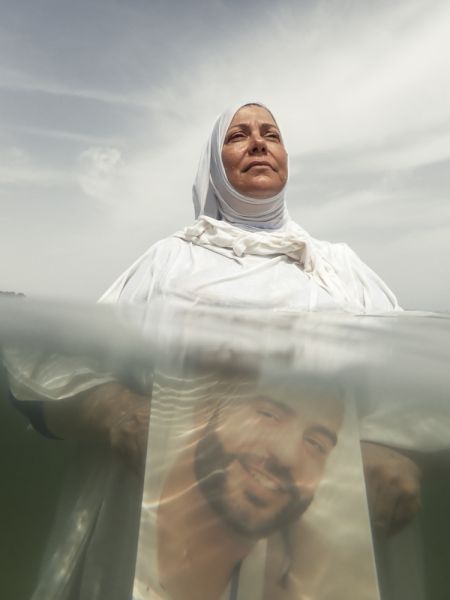

“From the womb of suffering comes activism. Look at me, look at us. The silence of our children weighs us down, the silence of the state crushes us. Carry our voices across the sea”.
Portrait of Laila Akik, a Tunisian activist at a demonstration, holding a photo of her son Youssef, who disappeared at sea on 31-7-2020. He was last seen at sea in a difficult position by one of the two survivors of the shipwreck.In his last phone call, Youssef was 20 kilometers from Italy. “I can see the island of Pantelliera, múm.”
-
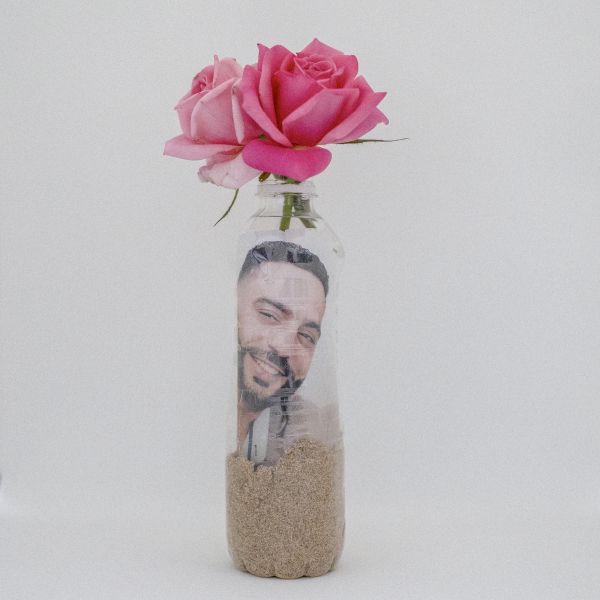

Bouteilles à la Mer made with Laila Akik for her son Youssef. Leila wrote this letter as if it had been written by her son Youssef Saidana.
Letter: “Our country despised us and forced us to emigrate, and to die we were sent alive. Forgive me, múm, forgive me the pain of separation and the pain of longing. You did not see me getting married, and I wasn’t buried like everyone else. About your troubles and misery, you know well, múm, in our country we are not allowed to realize our dreams. But death came and took me, in the form of a sea wave that entombed me —My dear múm, only one last wish: do not forget me and see me in every Tunisian young man and girl, and be a fighter, so we have justice, equality and freedom for our future generations. Dad, take care of my loving mother and brothers. Protect them. Finally, greet Tunisia and tell her I love her, no matter how much she suffers and how many times I die.”
In June 2023, Youssef’s body was found in Zarzis buried at the Jardin d’Afrique de Zarzis Memorial cemetery after the exhumation of multiple graves linked to the contentious and widely media-covered shipwreck of September 18, 2022. The bottle Layla used is thought to come from a shipwreck and is now housed within the Zarzis Sea Memory Museum. -
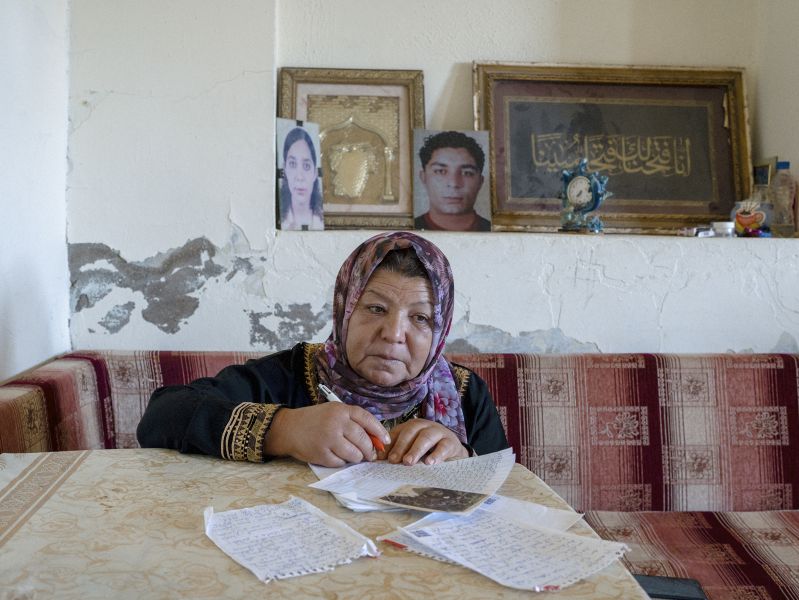

Tunisia (Sfax – Ouled Msallem), 30-08-2022.
Souad Ben Sassi wrote the letter for her bottle at her home in Oulad Msallem, the main place for the sea crossings. On 11 March 2011, Bader, aged 30, set sail for Italy in a fisherman’s boat with other Tunisians. He left his mother and 5 brothers and sisters behind. In her heart, Bader is still alive, but 12 years later, after a relentless struggle to find her son, doubts arise. -
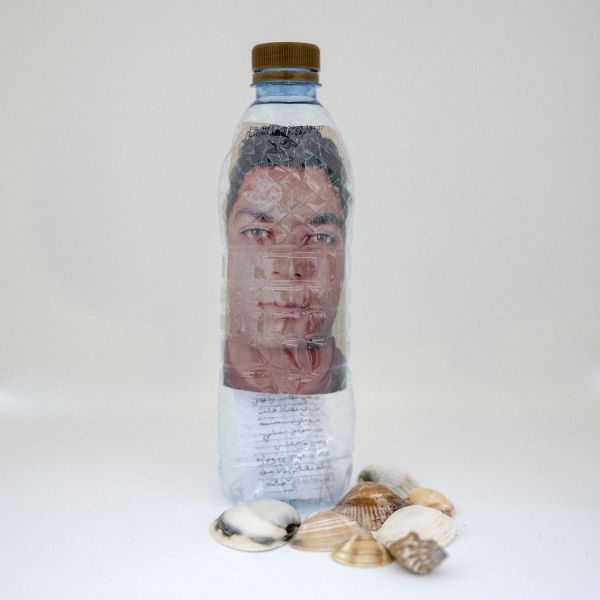

بدر يا غالي من يوم رحلت . و انا في انتضارك منسيتكش و مش بش ننساك. من بعد ما البحر مني خذاك خلاني حايره . حزينه . كبدي مشويه . بدر يا غالي عليا روحي بعدك هانت عليا . و مازلت مستنيه بدر . كيفاش نساني مشا و خلاني
خلاني في حزن و مراره مراره البعد نعاني للأسف اكتب هذه الرسالة و اقول امك تحبك برشارسالة الى ابني عبر البحر
Bouteille à la Mer made with Souad Ben Sassi for his son Bader.
“My dear Bader, since you left, I have been waiting for you, I didn’t forget you and I won’t forget you. After the sea caught you, I remain sorrowful. My liver and my faith are burning too*. My dear Bader, my soul is worthless. I ask myself: Where is Bader? Why did you leave? How could you let me go through this suffering? It’s Valentine’s Day, I am writing this letter to tell you Bader, that your mother loves you. (Letter to my son that pierces the sea.)”.
*Popular Tunisian saying to express pain. -
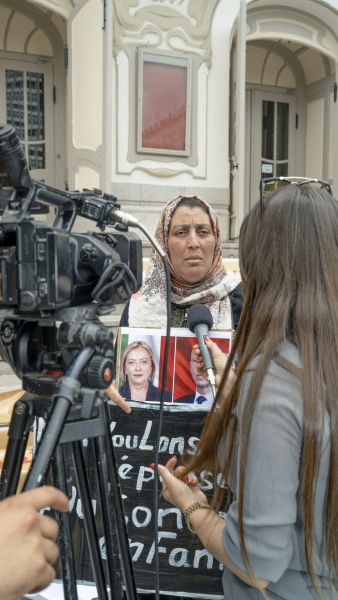

Tunisia (Tunis), 12-6-2023.
Dalila, the wife of Basset Hamdi, who vanished on September 6, 2012. Dalila is a key figure in La Terre Pour Tous Association and a tireless activist. For more than a decade now, she has been caring for three kids while her husband’s been missing. As a single mother with a non-deceased husband, she’s legally unable to access aid, rebuild, or make decisions.
Her plea: a certificate recognizing the reality of sea disappearances. She is seen here participating in the demonstration in front of the National Theater of Tunisia. -
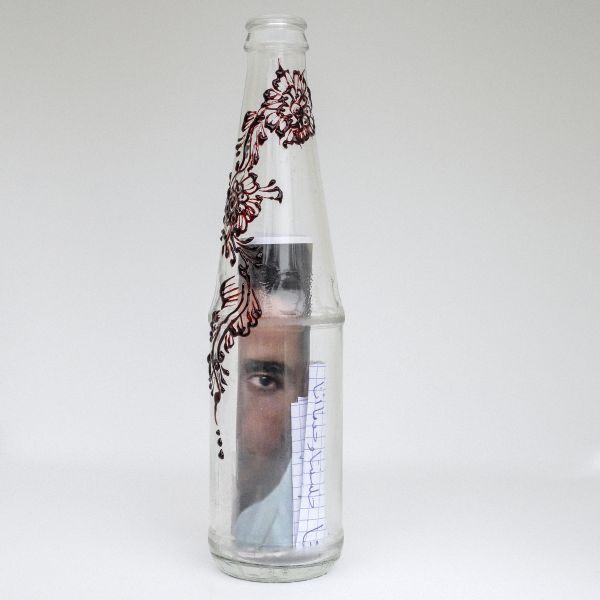

Bouteille à la Mer made with Dalila Basset for her husband.
“I’m scared because Yassin, your son, wants to make the crossing like you did. But I’m not going to let him. I pray that God will give me strength“.
Basset Hamdi was her true love, a husband she took of her own volition. They were married against the will of her parents. Dalila supports herself by working occasionally (cleaning houses and doing henna body decorations for weddings).
She is alone, and afraid that one of her three sons might also take the dangerous journey. Dalila lives in a perpetual limbo, in a sort of fictional marriage. -
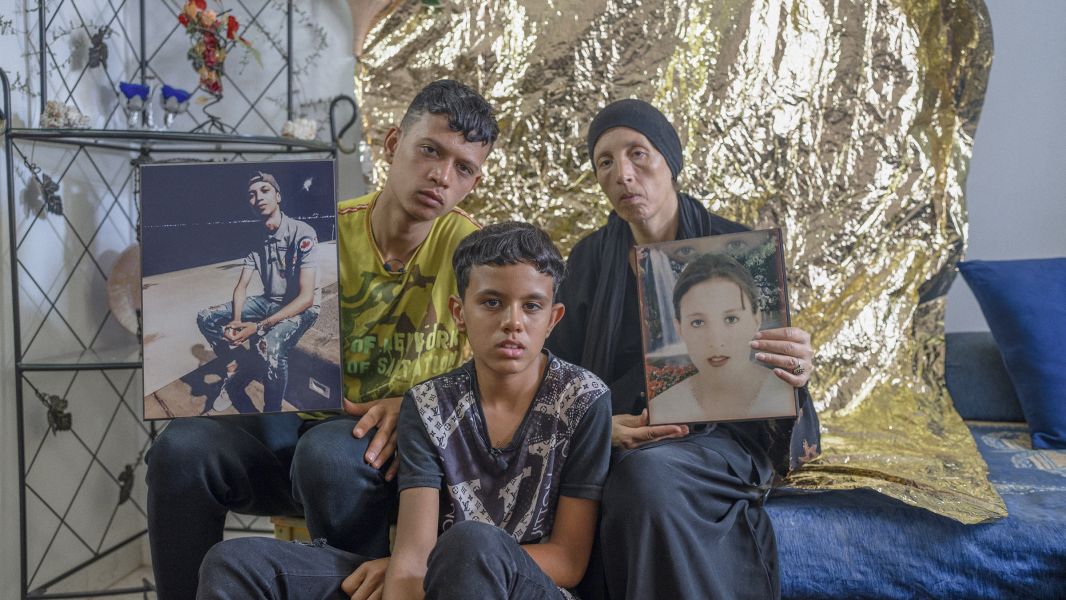

Tunisia (Mourouj -Tunis), 23-10-2023.
Skander Othmani’s family portrait at home. Skander vanished with friends secretly. His mother, Mongia, looks for him tirelessly.
“We’ve done everything —complaints, lawyers, searches, reaching out to authorities. It’s like Skander never existed. Sometimes I doubt it myself —if I hadn’t seen photos of him on that boat, I’d think he never left.” Since Skander’s departure, Mongia wears black, mourning without closure. Younger siblings hope to reunite with their big brother and the mother they know. -
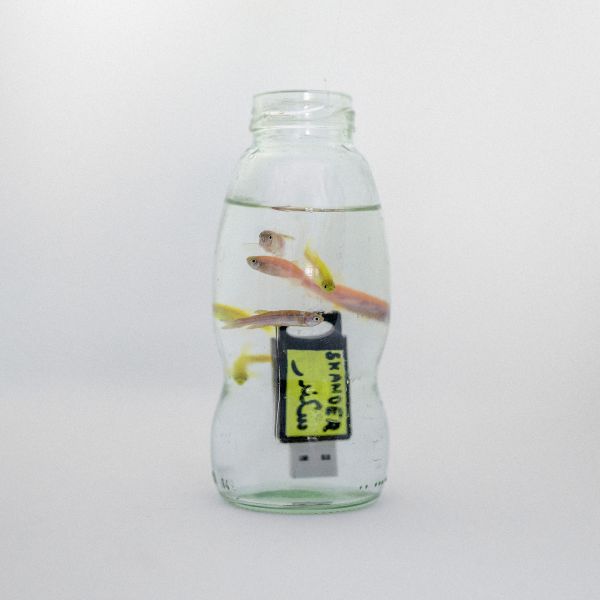

Bouteille à la Mer made with Mongia Othmani. Monjia has given me a USB that contains all the research carried out to find Skander. There are videos at sea of Skander in no difficulty, photos in a detention center in Italy, selfies of Skander with his friends, and the Facebook profile of the boat’s captain. All these efforts to find him have come to nothing because there is no one willing to listen and understand. Metaphorically, Monjia pulls in water from this research.
Faced with this void, she conjures up the worst imaginable scenarios:
“I imagine him alive, I imagine him dead, I imagine him eaten by fish, I imagine him in a mountain, I imagine him dead, I imagine him dead. I imagine him in a mountain, I imagine him in prison, I imagine him being tortured, I imagine him in people’s homes…“. -
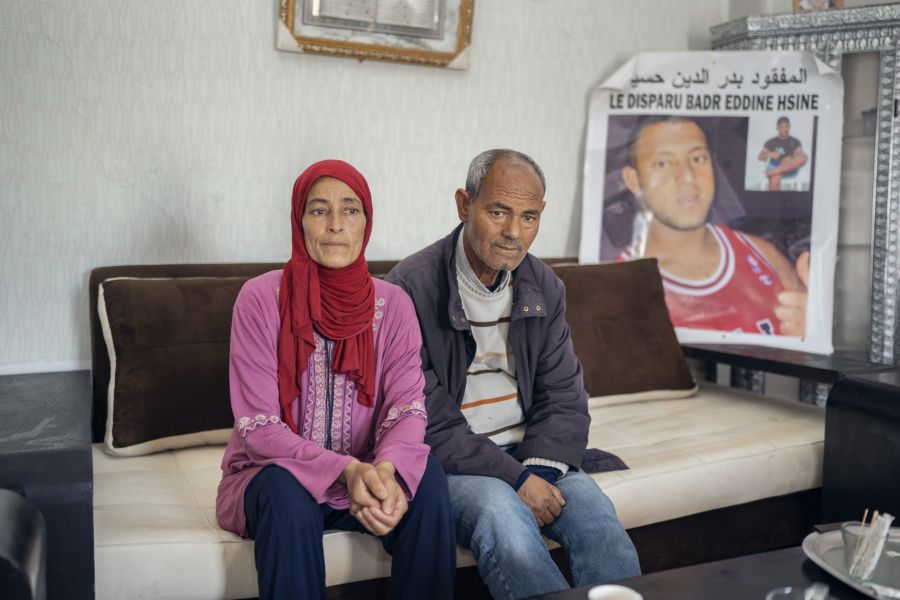

Tunisia (Enfidha), 4-4-2023. Portrait of Bader Eddine Hssine’s family in their living room. I visited them accompanied by Wael Garnaouia, a psychoanalyst and a specialist in the irregular migrations of Tunisians. On 27 July 2022, Bader, their son, and 4 friends went to Europe in kayaks. Since then, there has been no news. The conversation was filmed:
Leila Salah: “Do you want to know the day I’ll remember for the rest of my life? It’s the day when my son called me to say, ‘Hello, Mom!’, as he used to when he worked at the factory, calling before arriving home. He repeated ‘Badr! Badr!’ twice. Always. I want to hear his voice even through a phone! I just want to know if my son is alive. I don’t need anything else. Not money, nothing. I swear… Tell me lies. I need to be lied to, even though deep down, I know it’s not true… I need to believe in this lie. It’s my refuge, my remedy.
Wael Garnaoui: I empathize. There’s nothing harder than what you’re going through. It’s because you haven’t experienced things as they’re supposed to be. When a person loses a loved one – and I sincerely hope Badr is not dead -:::
Belgacem Hssine: INSHALLAH
Wael Garnaoui: … They go through different stages. At first, it’s the shock, of course. We wonder why this tragedy happened to us. Then sadness overwhelms us. Finally, we (bury) it. That’s when life resumes its course. In your case, you’re still experiencing that initial state of shock…
Belgacem Hssine: Exactly. -
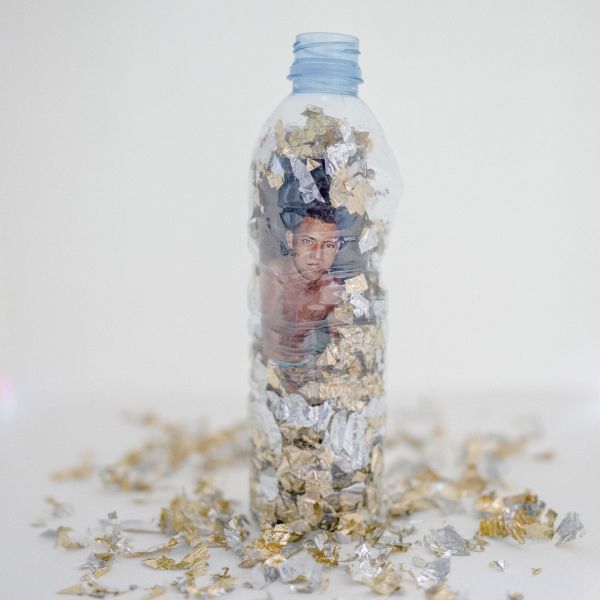

Bouteille à la Mer made with Leila Hssine.
On 13 October 2023, Leila’s hopes were crushed. Bader’s 4 friends returned to the small town. They had been imprisoned ever since and were unable to communicate. They told Leila that the two kayaks had capsized. The police had intercepted the 4 friends, leaving Bader lying in the water. In addition to the lack of rescue operations, there is also a lack of will. Rescue at sea is a moral duty as much as a legal, supervised, and organized obligation.

This participatory platform is designed to collect the stories that the Tunisian families of the missing have chosen to share without any obligation. It is not a database, but an area of action where you can commemorate, bring faces to light, and advocate freely. It is dedicated to all those who refuse to forget their departed loved ones and who resist the violence of European migration policies.
To the families of the missing, we insist: Take this space, it’s yours. It comes alive when you invest in it. Words can heal wounds.
![]() only comes alive through the interconnectedness of families, local associations committed to the dignity of individuals, and activists from everywhere.
only comes alive through the interconnectedness of families, local associations committed to the dignity of individuals, and activists from everywhere.